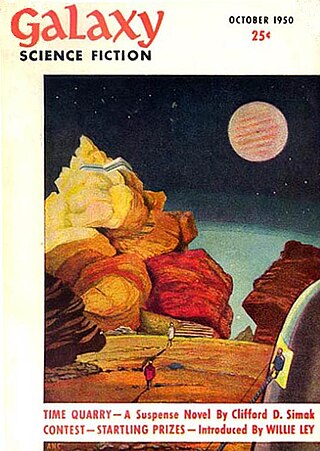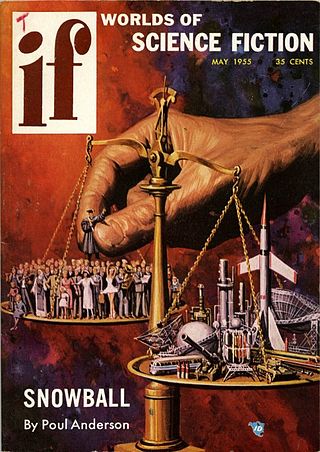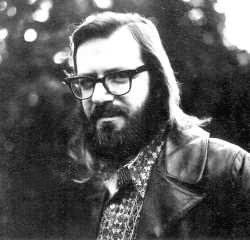Related Research Articles

Fritz Reuter Leiber Jr. was an American writer of fantasy, horror, and science fiction. He was also a poet, actor in theater and films, playwright, and chess expert. With writers such as Robert E. Howard and Michael Moorcock, Leiber is one of the fathers of sword and sorcery and coined the term.

Michael John Moorcock is an English–American writer, particularly of science fiction and fantasy, who has published a number of well-received literary novels as well as comic thrillers, graphic novels and non-fiction. He has worked as an editor and is also a successful musician. He is best known for his novels about the character Elric of Melniboné, which were a seminal influence on the field of fantasy in the 1960s and 1970s.

Sword and sorcery (S&S) or heroic fantasy is a subgenre of fantasy characterized by sword-wielding heroes engaged in exciting and violent adventures. Elements of romance, magic, and the supernatural are also often present. Unlike works of high fantasy, the tales, though dramatic, focus on personal battles rather than world-endangering matters. Sword and sorcery commonly overlaps with heroic fantasy. The genre originated from the early-1930s works of Robert E. Howard. The term "sword and sorcery" was coined by Fritz Leiber In the May 1961 issue of the fantasy fanzine Amra, to describe Howard and the stories that were influenced by his works. In parallel with "sword and sorcery", the term "heroic fantasy" is used, although it is a more loosely defined genre.

Robert Shaw was a science fiction writer and fan from Northern Ireland, noted for his originality and wit. He won the Hugo Award for Best Fan Writer in 1979 and 1980. His short story "Light of Other Days" was a Hugo Award nominee in 1967, as was his novel The Ragged Astronauts in 1987.

Galaxy Science Fiction was an American digest-size science fiction magazine, published in Boston from 1950 to 1980. It was founded by a French-Italian company, World Editions, which was looking to break into the American market. World Editions hired as editor H. L. Gold, who rapidly made Galaxy the leading science fiction magazine of its time, focusing on stories about social issues rather than technology.

If was an American science fiction magazine launched in March 1952 by Quinn Publications, owned by James L. Quinn.

Sam Youd was a British writer best known for science fiction written under the name of John Christopher, including the novels The Death of Grass, The Possessors, and the young-adult novel series The Tripods. He won the Guardian Children's Fiction Prize in 1971 and the Deutscher Jugendliteraturpreis in 1976.

Terry Gene Carr was an American science fiction fan, author, editor, and writing instructor.
Keith John Kingston Roberts was an English science fiction author. He began publishing with two stories in the September 1964 issue of Science Fantasy magazine, "Anita" and "Escapism".

Edwin Charles Tubb was a British writer of science fiction, fantasy and western novels. The author of over 140 novels and 230 short stories and novellas, Tubb is best known for The Dumarest Saga, an epic science-fiction saga set in the far future. Michael Moorcock wrote, "His reputation for fast-moving and colourful SF writing is unmatched by anyone in Britain."

James Henry Schmitz was an American science fiction writer born in Hamburg, Germany of American parents.
This is a bibliography of works by Damon Knight.
Everett Franklin Bleiler was an American editor, bibliographer, and scholar of science fiction, detective fiction, and fantasy literature. In the late 1940s and early 1950s, he co-edited the first "year's best" series of science fiction anthologies, and his Checklist of Fantastic Literature has been called "the foundation of modern SF bibliography". Among his other scholarly works are two Hugo Award–nominated volumes concerning early science fiction—Science-Fiction: The Early Years and Science-Fiction: The Gernsback Years—and the massive Guide to Supernatural Fiction.

There have been many attempts at defining science fiction. This is a list of definitions that have been offered by authors, editors, critics and fans over the years since science fiction became a genre. Definitions of related terms such as "science fantasy", "speculative fiction", and "fabulation" are included where they are intended as definitions of aspects of science fiction or because they illuminate related definitions—see e.g. Robert Scholes's definitions of "fabulation" and "structural fabulation" below. Some definitions of sub-types of science fiction are included, too; for example see David Ketterer's definition of "philosophically-oriented science fiction". In addition, some definitions are included that define, for example, a science fiction story, rather than science fiction itself, since these also illuminate an underlying definition of science fiction.
Bibliography of science fiction, fantasy, historical fiction and nonfiction writer L. Sprague de Camp:
This is a bibliography of the works of Michael Moorcock.

The Moment of Eclipse is a 1970 collection of science fiction short stories written by Brian Aldiss between 1965 and 1970. It was originally published by Faber & Faber. In 1972, the collection, in its entirety, received the first BSFA Award for short fiction published in 1970-71.
This is complete list of works by American science fiction and fantasy author Fred Saberhagen.

List of the published work of Robert Silverberg, American science fiction author.
Bibliography of science fiction, fantasy, and nonfiction writer Lin Carter:
References
Notes
- ↑ H. H. Hollis at the Internet Speculative Fiction Database
- ↑ Nicholls 1979, p. 289.
Bibliography
- Harlan Ellison, ed. (1972). Again, Dangerous Visions. New York: Doubleday. ISBN 0-575-04144-7.
- Peter Nicholls, ed. (1979). The Science Fiction Encyclopedia. London: Roxby Press Limited. ISBN 0-246-11020-1.